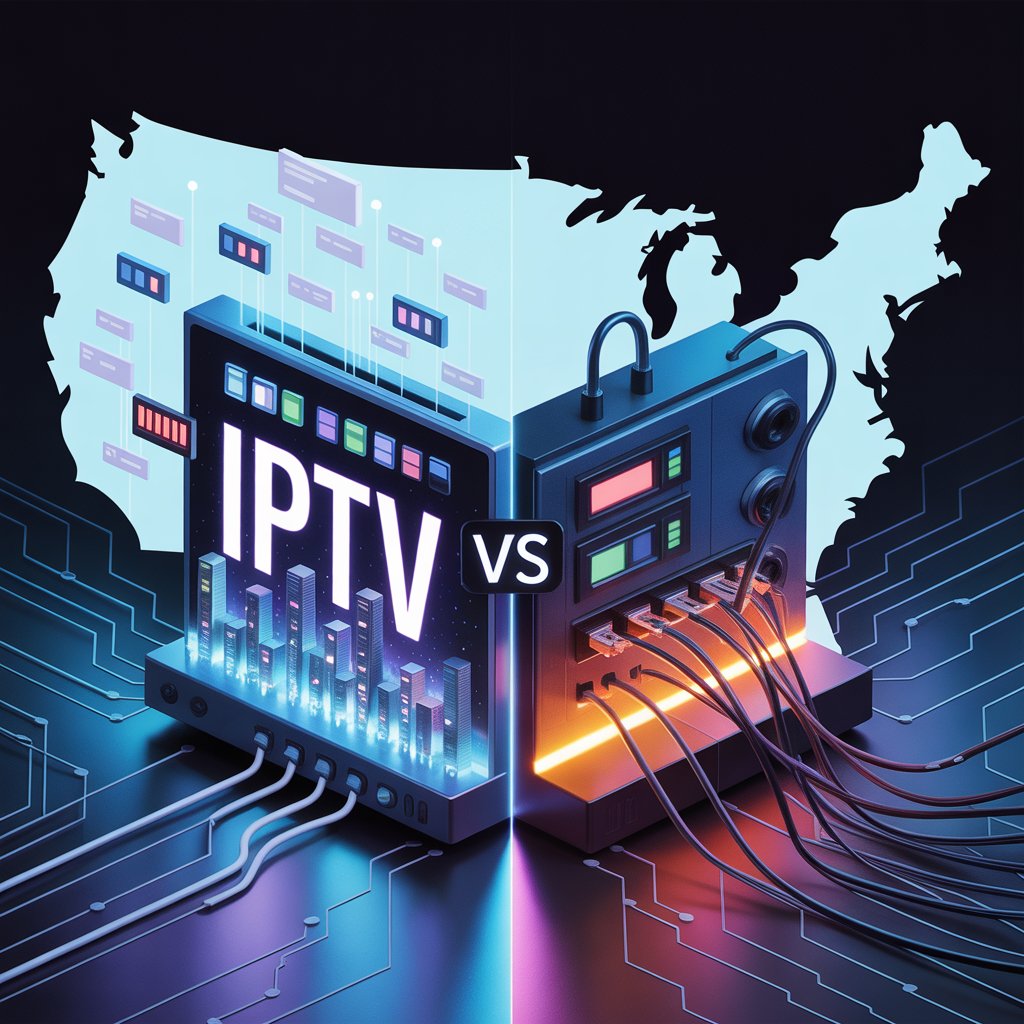iptv vs cable

- Flexibility
The distinction between IPTV vs cable is obvious. IPTV gives users the ability to pause, rewind, and fast-forward shows, which are features that traditional cable does not provide. Users can watch content whenever they want. In the IPTV vs Cable debate, IPTV stands out because it lets viewers watch their favorite shows on a variety of devices, whether they are at home or traveling. IPTV, in contrast to cable, which adheres to predetermined schedules, offers complete user control. Therefore, in terms of freedom and convenience,IPTV vs Cable clearly shows IPTV as the more flexible option.
- Device Compatibility
When comparing IPTV vs Cable, IPTV’s device compatibility is a significant benefit. Content can be streamed on smart TVs, smartphones, tablets, laptops, and even gaming consoles with IPTV.In the discussion of IPTV vs Cable,A set-top box is typically required for cable services, and only one television can be used at a time. Also highlighted in IPTV vs. Cable is the fact that IPTV lets multiple devices be used simultaneously, so different users can watch different content on different screens.
IPTV, in contrast to cable, which requires a fixed setup, provides true mobility. When you consider that IPTV apps can be installed easily on most devices without the need for additional hardware, the competition between IPTV vs cable becomes even more apparent. In a nutshell, IPTV vs Cable demonstrates IPTV’s superior lifestyle adaptability.
- Content Access
IPTV vs cable differ significantly in terms of the content that viewers can access. IPTV lets you watch a lot of different channels and on-demand content from all over the world, like international shows, niche genres, and specialty shows. Cable TV, on the other hand, focuses on local or regional channels and frequently restricts the variety of content that is available. Because of this, IPTV is a better option for viewers who want to watch more than just standard programming.
The availability of on-demand and catch-up services is another crucial aspect of the IPTV vs Cable comparison. Instead of adhering to the predetermined schedules offered by cable. IPTV users can watch their preferred shows whenever they want. The availability of global content at any time greatly expands the options for entertainment. In general, IPTV outperforms Cable when it comes to providing modern viewers with a richer, more diverse, and more convenient content library.
- Cost Efficiency
When discussing cost effectiveness, the contrast between IPTV vs cable reveals significant pricing differences. When compared to traditional cable subscriptions, IPTV services frequently offer monthly plans that are less expensive. Users can customize their channel packages with many IPTV providers, paying only for the content they want. This helps cut down on unnecessary costs. However, cable packages frequently include large bundles of channels, many of which are not watched but still add to the overall cost.
The cost of equipment and installation is another important factor in the IPTV vs Cable debate. Set-top boxes and sometimes professional installation are usually needed for cable services, which can cost extra up front and over time. IPTV, on the other hand, works with internet-connected devices like smart TVs, computers, and mobile phones, so it doesn’t need to rent expensive hardware or pay for installation. IPTV is frequently more affordable as a result of this.
Final differences between IPTV vs cable include contract flexibility and hidden fees. Customers of cable companies frequently sign long-term contracts with penalties for early cancellation and additional fees for sports packages or premium channels. Users have better control over their spending because IPTV services typically offer month-to-month subscriptions without penalties and with fewer hidden fees. IPTV is generally more cost-effective for consumers seeking flexible, affordable entertainment.
- Internet Dependency
Internet dependence is one important aspect of the IPTV vs Cable comparison. Because IPTV relies solely on a fast and stable internet connection to smoothly stream content, issues with the internet may impede viewing. Cable television, on the other hand, does not rely on the internet and typically delivers a signal that is more consistent. Therefore, when deciding between IPTV vs cable, viewers in areas with unreliable internet connections may choose cable, whereas IPTV users can take advantage of advanced features.
